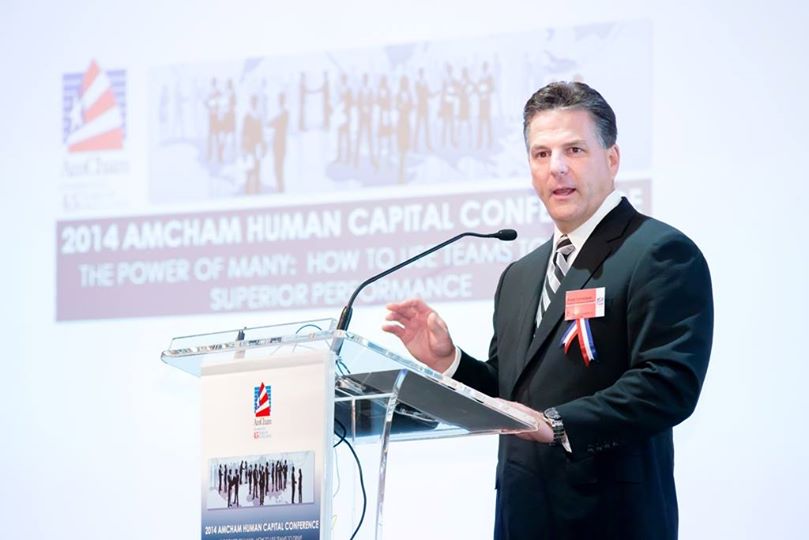
The AmCham Human Capital Conference (HCC) has made quite a name for itself in the last few years, and its 23rd instalment proved that its reputation is well-deserved. The 2014 conference revolved around teams, and how to effectively manage them. More specifically, the organisers framed the theme as ‘The Power of Many: how to use teams to drive superior performance’.
Bad apples
This year’s HCC Chair was Clare Allum, Tax Talent Leader—Asia Pacific, EY, who kicked off the event with a simple, but astute observation, “It only takes one mean person to spoil a team.”
We all work and play in teams; they are an inevitable part of everyday life. Allum argued that they should reflect diversity in culture, gender, generation and different behavioural styles, but that we also have to beware bad apples that could potentially ruin a good collaboration.
She elaborated, “Being part of a team, especially a winning team, you want to feel that your opinion is valued and that you are helping drive initiatives. As we all know, different corporations have a variety of ways to run a team effectively, but challenges remain even so.”
There is no ‘I' in team
Contrary to the popular saying, that there has to be an ‘I’ in team, finding the perfect amount of I, or self, to put into a team effort is a little tricky. Allum asserted that we have to be aware of how much we let ourselves shine through and learn to identify when it is better to bite our tongues.
She stated, “Sometimes, if the team is not moving forward, you need to move things forward —then the ‘I’ has to come out. But sometimes if the ‘I’ comes out too much, you might get fragmentation and cliques developing, in which case you need to redefine roles and mitigate in order to better facilitate the team’s future. We’ve found small teams have worked much better because members feel they are participating more.”
Making leadership teams work
The CEO panel shared valuable insights from the frontlines, with senior executives from some of the region’s biggest companies sharing their experience about how leadership can influence the effectiveness of a good team.
Michael MacLeod, CEO, Hong Kong Philharmonic Orchestra, spoke about his experience managing some of the most notoriously unmanageable people: opera singers and musicians. “What’s the difference between a prima donna and a terrorist?” he asked the audience. “You can negotiate with a terrorist.”
He pointed out the importance of a strong leader to cope with diverse teams, adding, “All those prima donnas need a good conductor to try and surpass
the individual ego and make everyone play together as a whole team. If you are intent on hiring the best people for the job, then there’s no need to have a curtain.”
Cecelia Zhang, Managing Partner, Greater China Advisory, EY, commented on her organisation’s diversity policy, “We have our own DNA, so you need to respect the diversity within the organisation, but you have to invite the new blood in the organisation as well, so that they can help make the existing DNA stronger by adding in their own ideas. This is something that happens over a period of time, so you have to be very patient during this process.”
How do you get teams excited and determined to win?
Sometimes, an unconventional approach can turn out to be far more effective than traditional management tactics, such as the idea put forth by Maaike
Steinebach, Chief Executive, Hong Kong Branch, Commonwealth Bank of Australia.

The CEO panel from left to right: Mitya New (moderator), Evan Auyang, Maaike Steinebach, Cecilia Zhang, Joy Xu and Cecilia Zhang.
She said, “I invited the whole team to come over to my house. What this did was get people in a different environment—there were people in the team who didn’t even know if others were married etc.”
The idea here is to get the team members to work on events that are fun, socially responsible and healthy. She shared, “The energy in the team has grown dramatically, and people spend more time with each other—and that transfers to more help for management.”
MacLeod agreed that spending time outside of work is a good thing, and pointed to the importance of touring overseas in helping teams perform better, “Going on tour, when you have to share planes, trains, buses, bars—it has a very beneficial impact. Also if you are playing in one of the great halls in the business, you know you are being compared to other internationally recognised orchestras, which helps raise the bar for team members.”
Cecilia Zhang, Managing Partner Consulting Greater China, EY mentioned the importance of excitement in a group, especially from the leader, “If you cannot excite yourself, then you won’t be able to excite the team members. So self-motivation is critical to exciting other team members. You need to be a visionary and ‘preach’ this to the rest of the team.”
Measuring teams
Facilitated by Stephen Kao, Managing Director, Progress U, ‘Measuring teams’ revolved around the importance, and challenges of measuring a team’s output and effectiveness.
He said, “You cannot improve upon something that you cannot measure. But what are the key KPIs that you would measure as enablers to achieve HiPo teams and how do you measure the performance of a team?”
The challenge is more about managing teams than individuals, according to Mitya New, Managing Director, Leading Organisations. He argued that teams are not simply a collection of all the individuals that make up the team, yet we still use individual performance systems and appraisal. He commented, “Many feel uncomfortable measuring team performance, because some may work hard and others may be freeloading. But if you’re going to measure a HiPo team, you need to measure performance. So we look at what drives the team—the enabler’s ACT model. Alignment within the team: how they collaborate, Clarity: sharing info and common understanding, and Trust: creating a zone of psychological safety.”

"You cannot improve on something you cannot measure," - Stephen Kao, Managing Director, Progress U and moderator for 'Measuring Teams'
Trey Davis, Director, Executive Compensation, Towers Watson referred to companies’ tendency to use money as both a measurement tool and reward system. He pointed out, “Organisations most frequently want to measure output in terms of profits. You pay on the results you measure. You can use results to inform the team what they’re doing well and what they can improve on to help improve on total shareholder return and total corporate performance. The purpose of pay for performance is not only to help drive performance, but also to help managers focus on areas of future enhancement.”
Rather than laying emphasis on what to measure, it can be said that what’s done with the data is far more important. Mary Keighton, Vice-President, Human Resources, PVH explained, “What a leader actually does with data obtained matters much more than what you actually measure. How do you work with a leader who doesn’t have that mindset of how to use KPIs to help get them to that level?” She added that the importance of leadership should not be overlooked, “It should be a leader-driven—not a HR-driven—process. The leaders should be telling HR which direction they should be going in.”
HR…It’s like herding cats
Managing diversity in teams is something that most of us will have encountered as one of the major challenges in modern HR. Getting individuals from very different backgrounds and lifestyles into one room or company can be incredibly rewarding, but it definitely comes with a set of challenges. Elisabeth George, Professor of Management, Hong Kong University of Science and Technology, is very familiar with these issues. She observed, “It’s like herding cats. We need to turn the reward scheme on its head. We could be using diversity in a better way —we should try to turn this into an advantage.”
And much like training cats, managing diverse individuals can feel like an impossible task. Instead of focusing on bridging the gap between backgrounds, she argued, we should be looking to get as much as we can from different inputs, and how to stimulate new ideas from all directions. Moreover, she identified three key aspects of being a good team member: ability, motivation, and coordination.
At the end of the day, after the speakers had had their say and all was said and done, the 23rd AmCham HCC turned out to be an enlightening experience for all involved. Old notions were shattered, and new ideas presented in talks that were often funny, interesting and most importantly, great advice for any HR professional.




